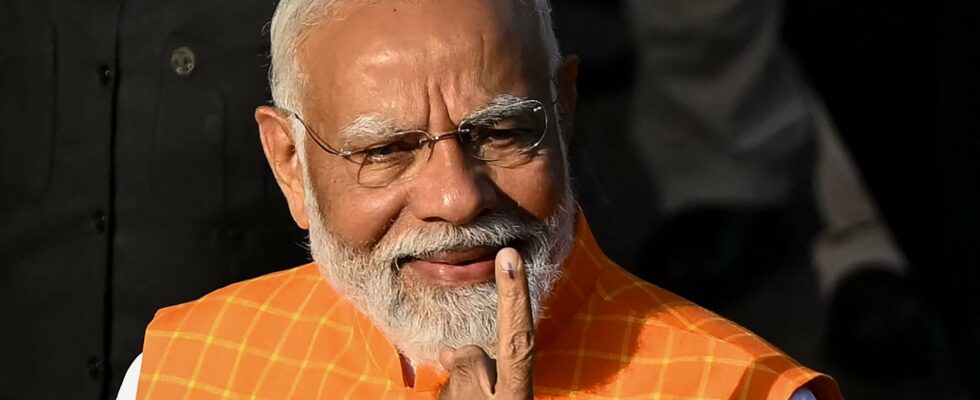There was little doubt about the result. Indian Prime Minister Narendra Modi, 73, is in the process of being re-elected for five years at the head of his country, which he has led since 2014. According to an exit survey by CNN-News18, his party , the BJP (Bharatiya Janata Party), and its allies should obtain at least 355 seats in the Lok Sabha, the lower house of Parliament, well above the absolute majority, set at 272.
These projections have not always been reliable, but Narendra Modi has already taken the floor to congratulate himself on the result. “I can say with confidence that the people of India voted in record numbers to re-elect the government,” he said on Saturday on X, adding that voters “have seen our record and how our work has changed the lives of the poor, the marginalized and the disenfranchised.” The final result of the vote will not be announced until Tuesday June 4, which will conclude one of the longest democratic exercises in the world. For six weeks, province after province, 968 million Indians were called to vote for their deputies.
Voter turnout, on the other hand, is expected to be down compared to 2019, when it reached 67%. The cause: the crushing heatwaves that hit the country, with temperatures often above 45 degrees, discouraging voters from leaving their homes and disrupting the functioning of polling stations. On Saturday alone, the last day of voting, 33 polling agents died due to the heat in the state of Uttar Pradesh.
Victory of Hindu nationalism
Narendra Modi’s victory once again demonstrates the effectiveness of his Hindu nationalist rhetoric, which advocates the supremacy of Hinduism over other beliefs and makes this religion the foundation of Indian identity. During his campaign, the Prime Minister, an excellent tribune, increased his stigmatizing remarks against Muslims – 200 million Indians -, described as “infiltrators”. The alleged violence of the latter and the threat of a large replacement, although impossible given current demographics, have mobilized many Hindu voters. As was the construction of the Rama temple, in the city of Ayodhya, on the ruins of a mosque destroyed by Hindu fanatics in 1992. Narendra Modi made this project a symbol of his mandate and lasting hegemony of Hinduism for decades to come.
However, the Prime Minister’s economic assessment is far from positive. Although growth is strong, at more than 7%, poverty remains massive, foreign investments have been at half-mast since last year, and unemployment is exploding, particularly among young people. In India, the most populous country on the planet, 40% of those under 25 who have completed higher education do not have a job. Narendra Modi compensates for these poor results with an impressive cult of personality that places his face everywhere in the streets, even on food aid bags! He also plays on the weight he gave to India on the international scene, praised by voters. An active and profitable foreign policy at the polls, also making him very courted by his counterparts: he has visited more than 70 countries, including the United States eight times, France seven times and China and Russia five times since 2014.
Modi opponent returned to prison
With a majority which should be renewed, Narendra Modi is further increasing his influence on the Indian political scene. Several of his political opponents are in prison or on trial. This is the case of Arvind Kejriwal, chief minister of Delhi, imprisoned in March for a bribery case. He was granted bail by the Supreme Court while he campaigned. This completed, he returned to his cell this Sunday, June 2. “When power transforms into dictatorship, prison becomes an obligation,” he warned on social networks, referring to the regression of rights and freedoms in India. Hemant Soren, former chief minister of Jharkhand state, was also arrested in February in another corruption probe.
The opposition, which had united behind the Congress, the main opposition party, will therefore have failed to remove Narendra Modi from power. Weakened by its last two electoral defeats, without an official candidate for the post of Prime Minister and ruined by the party financing reform, adopted in 2018, which largely benefited the BJP, the Congress campaigned on respect for the State of law and the cost of living. He can at least rejoice in the fact that Narendra Modi has not, for the moment, achieved his target of 400 seats in the Lok Sabha.
This two-thirds majority would have allowed him to modify the constitution as he wished to undermine the secular and multi-confessional foundations intended for the country’s independence, and reduce the weight of the southern provinces in Parliament, which are traditionally hostile to him.
